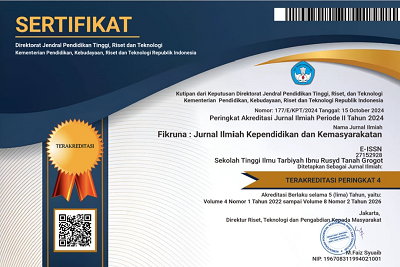STRATEGI MANAJEMEN SYARIAH DALAM MENGHADAPI ERA DIGITAL DAN MEMENANGKAN PERSAINGAN PASAR DI SAMARINDA (STUDI KASUS PADA PERUMAHAN SHARINATA CITY)
Abstract
The purpose of this research is to understand the strategy of sharia management in facing the digital era to win market competition, by implementing the following four strategies: 1. To determine how significant the impact of using sharia management strategies is in winning market competition. 2. To determine how significant the impact of collaborating with new businesses that have developed or started to grow in the market using technology in line with the digital era, in winning market competition. 3. To determine whether training all executives to understand the meaning of disruption and reshape their mindset will ensure that the company remains viable and competitive in the market. This research is a qualitative descriptive study with a case study approach. Qualitative research aims to obtain a general understanding of social reality from the participants' perspectives through descriptive data. This is a field research study. Research Findings: After considering the SWOT analysis procedure, the strategy for Sharinata City Housing Company in Samarinda, based on the analysis, is as follows: Optimize existing services to attract and encourage customers to join and invest in sharia-based housing and other investments at the Sharia housing company Sharinata City Samarinda. Increase socialization to all segments of society. Utilize human resources (HR) to introduce its products to customers.
References
Al Ries dan Hermawan Kertajaya, 1977, Fokus, masa depan perusahaan anda ditentukan oleh fokus, Edisi Ketiga, Jakarta, PT Gramedia Pustaka Utama.
Ali Muhammad Taufik, 2004, Prkatik Manajemen Berbasis Al-Qur�an , Jakarta: Gema Insani
Berry, L, and Parasuraman. 1991. Marketing Service Competing Through Quality. New York: The Free Press.
Bilson Simamora, 2002. Panduan Riset Perilaku Konsumen, Jakarta: Gramedia Pustaka Utama.
Firmanzah , 2012.Pemasaran Politik, Antara Pemahaman dan Realita. Jakarta: yayasan Obor Indonesia Kotler, Philip, dk.2010. Pemasaran 3.0. jakarta: Erlangga.
Handayani, R, Yermias T. K., dan Ratminto. 2003. �Analisis Kepuasan Pemakai terhadap Pelayanan Perpustakaan Nasional Provinsi Daerah Istimewa Yogyakarta�.
Sosiosains, Volume 17 Nomor 2, April 2003. Pasca Sarjana Fisipol UGM. Yogyakarta.
Hadrari nawawi, 1983, Administrasi Pendidikan, Jakarta : PT Gunung Agung
Harahap, isnaini. Dkk.2015. Hadis-Hadis Ekonomi. Jakarta: Prenadamedia Group.
Harahap, Saidurrahman.2016. Hukum Islam dalam Hukum Nasional� dalam Politik Islam Ala Indonesia: Kumpulan Essay Politik. Medan: Perdana Publising.
Husaini usman, 2003, Manajemen: Teori, Praktek dan Riset Pendidikan, Jakarta: Bumi Aksara
Husain Umar, Riset Pemasaran dan Prilaku Konsumen, (Jakarta: Gramedia, 2000)
Kasali, Rhenald. Disruption. Gramedia:Jakarta,2017
Malhotra , Naresh k. Marketing Reseach An Applied Orientation. Second edition, ( Prentice-hall International, Inc. New Yersey, 1983)
Mariono dkk.2008. Manajemen Dan Kepemimpinan Pendidikan Islam. Bandung: PT Refika Ditama
Nanang fatah,2008, Landasan Manajemen Pendidikan, Bandung: PT Remaja Rosdakarya
Prof. Dr. H. Engkoswara Dan Dr. Hj. Aan Komariah, M.pd.2012, Administrasi Pendidikan, Bandung: ALFABETA(Prentice �Hall International. Inc, New Yersey, 1983)
Porter, Michael.2000. Strategi Bersaing. Erlangga: Jakarta.
Ramayulis,2008, Ilmu Pendidikan Islam, Jakarta: Kalam Mulia
Syafiie, Kencana. INU, Drs.1993. Manajemen Indonesia. PT. Rieneka Cipta: Jakarta.
www.PwC.com/structure-for-futher-details. https://konsultansi.wordress.com
http://pendapatangirsang.blongspot.co.id/2012/12/kelemahan-dan-kaunggulan-sistem.html
Copyright (c) 2024 Kokom Komariah

This work is licensed under a Creative Commons Attribution-NonCommercial 4.0 International License.



.png)












